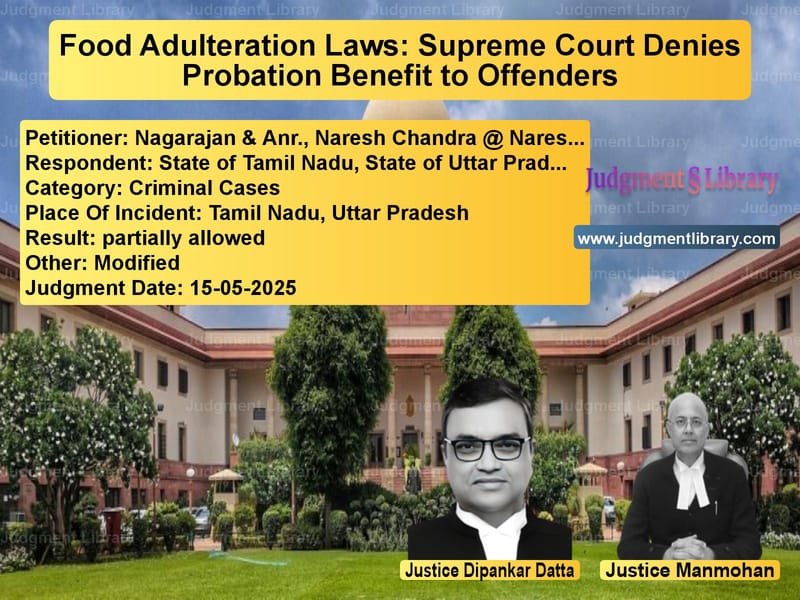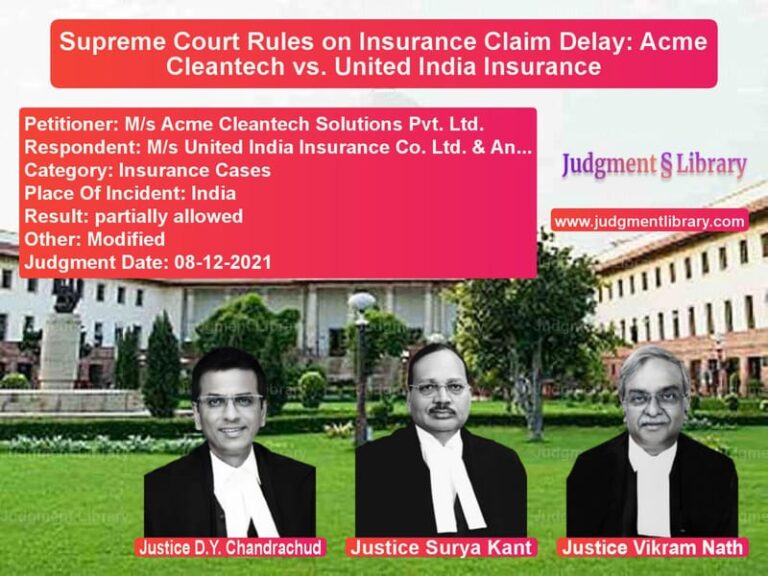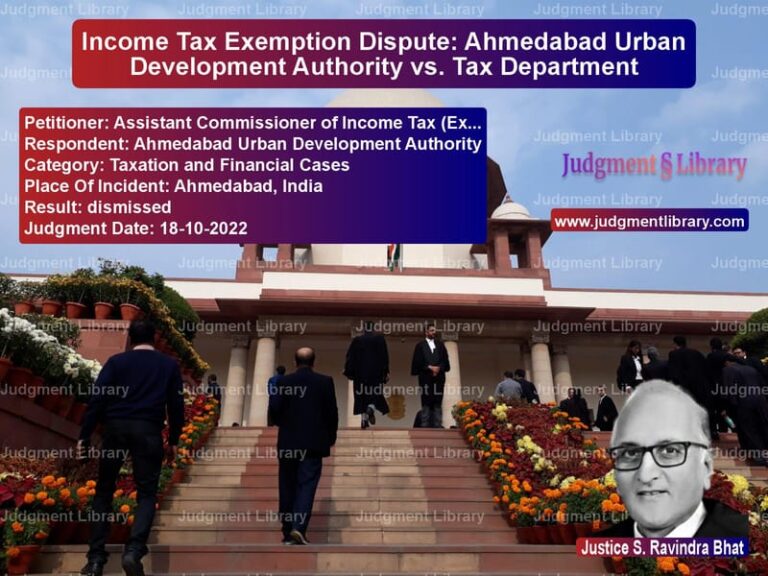Food Adulteration Laws: Supreme Court Denies Probation Benefit to Offenders
In a significant ruling that clarifies the legal landscape surrounding food adulteration cases in India, the Supreme Court recently delivered a judgment addressing two criminal appeals that questioned the applicability of probation benefits to offenders convicted under the Prevention of Food Adulteration Act. The cases, though arising from different incidents separated by time and geography, shared a common legal question that brought them together before the highest court of the land.
The lead appeal involved Nagarajan and Selvaraj from Tamil Nadu, who had been convicted for selling curd that failed to meet the prescribed standards under the Prevention of Food Adulteration Act. The sample taken from their shop on June 26, 2001, revealed that the fat content did not meet the required standards, leading to their conviction and sentencing to six months of simple imprisonment along with a fine. Their journey through the judicial system saw their conviction upheld first by the Appellate Court and then by the Madras High Court in revision, bringing them finally to the doors of the Supreme Court.
The connected appeal featured Naresh Chandra from Uttar Pradesh, whose case had an even longer history, dating back to March 20, 1985. His offense was not just about selling potentially adulterated food items but involved actively preventing a Food Inspector from taking samples for analysis. His conviction under the Prevention of Food Adulteration Act had similarly been upheld through the appellate process, culminating in the Allahabad High Court dismissing his revision petition.
Before the Supreme Court, the appellants raised several constitutional and legal arguments seeking mollification of their sentences. Their counsel argued that Section 20AA of the Prevention of Food Adulteration Act, which effectively denies the benefit of probation for first-time offenders, violates Article 14 of the Constitution of India. They contended that this provision creates an arbitrary classification without reasonable basis.
Furthermore, the appellants argued that Section 20AA violates Article 21 of the Constitution as the denial of probation impacts the liberty of individuals without due consideration of their circumstances. They emphasized that the Probation of Offenders Act, 1958, is designed to rehabilitate offenders and reduce the burden on the prison system, and denying this benefit goes against the reformative justice approach.
The appellants also pointed out that Section 20AA contradicts the reformative justice approach enshrined in Section 360 of the Criminal Procedure Code, 1973, which encourages rehabilitation of offenders. They made a significant argument based on legislative intent, noting that the Food Safety and Standards Act, 2006, which repealed the Prevention of Food Adulteration Act, does not include a provision equivalent to Section 20AA, indicating a move towards a more reformatory framework.
On the other side, the State of Tamil Nadu, represented by its counsel, placed great reliance on the express words in Section 20AA of the Prevention of Food Adulteration Act, which prescribes a categorical and complete exclusion of the applicability of the Probation Act and Section 360 of the Cr. PC. The State argued that the legislative intent is clear that food adulteration is a crime against public health, and perpetrators of such crimes must face consequences for their acts.
The State emphasized that Section 20AA was incorporated into the Prevention of Food Adulteration Act by way of amendment in 1976, and reliance was placed on the Statement of Object and Reasons for such amendment, highlighting the growing concern over the prevalence of food adulteration and the inadequacy of existing provincial laws to address the issue uniformly. The State of Uttar Pradesh, interestingly, did not press any arguments before the Court.
The legal framework under consideration included Section 20AA of the Prevention of Food Adulteration Act, which states clearly: “Nothing contained in the Probation of offenders Act, 1958 (20 of 1958) or section 360 of the Code of Criminal Procedure, 1973 (2 of 1974) shall apply to a person convicted of an offence under this Act unless that person is under eighteen years of age.”
The Court also examined Section 97 of the Food Safety and Standards Act, which deals with repeal and savings, specifically saving certain aspects of the repealed Prevention of Food Adulteration Act. The provision states that the repeal shall not affect previous operations, rights, privileges, obligations, liabilities, penalties, forfeitures, punishments, investigations, or remedies in respect of any offences committed against the repealed enactment.
Constitutional provisions, particularly Article 20(1) which protects against ex post facto laws, and international covenants were also considered by the Court in its analysis. The Court noted that Article 15(1) of the International Covenant on Civil and Political Rights, 1966, which India ratified in 1979, includes a provision similar to Article 20(1) of the Constitution.
The Supreme Court embarked on a detailed analysis of judicial precedents, beginning with cases decided before the introduction of Section 20AA in 1976. In Ishar Das v. State of Punjab, the Court had observed: “The provisions of Probation of Offenders Act, in our opinion, point to the conclusion that their operation is not excluded in the case of persons found guilty of offences under the Prevention of Food Adulteration Act.”
However, the Court in that case had rightly cautioned against resorting to the provisions in the Probation Act in normal circumstances, noting: “Adulteration of food is a menace to public health. The Prevention of Food Adulteration Act has been enacted with the aim of eradicating that anti-social evil and for ensuring purity in the articles of food. In view of the above object of the Act and the intention of the legislature as revealed by the fact that a minimum sentence of imprisonment for a period of six months and a fine of rupees one thousand has been prescribed. The courts should not lightly resort to the provisions of the Probation of Offenders Act in the case of persons above 21 years of age found guilty of offences under the Prevention of Food Adulteration Act…”
Subsequent decisions such as Jai Narain v. Municipal Corpn. of Delhi and Pyarali K. Tejani v. Mahadeo Ramchandra Dange upheld this view, with the latter observing that offences under the Prevention of Food Adulteration Act are economic offences and would therefore not be easily susceptible to the probationary process. The Court in that case quoted: “The kindly application of the probation principles is negatived by the imperatives of social defence and the improbabilities of moral proselytisation. No chances can be taken by society with a man whose anti-social operations, disguised as a respectable trade, imperil numerous innocents.”
After the 1976 amendment introducing Section 20AA, the Court in Prem Ballab v. State (Delhi Admn.) observed: “The imperatives of social defence must discourage the applicability of the probation principle. No chances can be taken by society with a man whose anti-social activities, in the guise of a respectable trade, jeopardise the health and well-being of numerous innocent consumers. The adulterator is a social risk.”
The Court also examined the decision in T. Barai v. Henry Ah Hoe, which dealt with the principle of beneficial interpretation of penal statutes for sentencing purposes. However, the Court distinguished this case, noting that it concerned punishment provisions and not release on probation, and there existed no provision similar to Section 20AA or Section 97 of the Food Safety and Standards Act in that context.
In Babu Ram v. State of Haryana, the Court had held unequivocally that the special provision made in the form of Section 20AA of the Prevention of Food Adulteration Act would override the provisions of the Probation Act. The Court stated: “We are inclined to agree with him that the special provision made in the Prevention of Food Adulteration Act overrides the provision of the Probation of Offenders Act and therefore the appellant will not be entitled to the benefit thereof…”
The Court also considered Rattan Lal v. State of Punjab, where it was held that an ex post facto law which only mollifies the rigour of a criminal law does not fall within the prohibition of Article 20 of the Constitution. The Court in that case observed: “If a particular law makes a provision to that effect, though retrospective in operation, it will be valid.”
In Basheer v. State of Kerala, the Court ruled that the concerned rule of beneficial construction of a penal statute is limited to the reduction of any sentence and the conviction remains under the old Act. The Court emphasized that when Parliament expressly excludes certain categories from beneficial provisions, such classification must be respected.
The Court also referred to Arvind Mohan Sinha v. Amulya Kumar Biswas, which delineated the purpose and object of the Probation Act: “The Probation of Offenders Act is a reformative measure and its object is to reclaim amateur offenders who, if spared the indignity of incarceration, can be usefully rehabilitated in society.”
In its analysis, the Supreme Court prefaced its observations by noting that it has consistently held that the safety of citizens is paramount. The safety of consumers was the goal of the Prevention of Food Adulteration Act as safety standards of food are essential for the health and well-being of citizens. The Court emphasized: “Food, as we all know, is essential for life and no leeway must be given in such circumstances.”
On the application of the Probation of Offenders Act, the Court applied the canonical rule of statutory interpretation, i.e., the rule of literal construction, which requires that words of a statute should be read as they are and understood in their natural and ordinary sense. The Court held: “There can be no quarrel that Section 20AA, introduced by way of amendment, is too clear admitting of no absurdity and seals this question of law against the appellants.”
The Court made an important distinction between reduction of sentence and releasing an offender on probation: “We are of the firm opinion that there exists a fundamental difference between reduction or mollification of a sentence and releasing an offender on probation. The probationary process envisages that first time offenders who are capable of reformation can be provided a benefit such that they can continue to a be a part of society as capable and law-abiding citizens in the future.”
While acknowledging that “Every saint has a past, and every sinner has a future”, the Court held: “While there is no quarrel with the probationary process, we ought to remain subservient to the wisdom of the legislature in applying the benefit of probation. This Court cannot offend the express provisions present in any legislative instrument merely to provide a benefit to an offender, not envisaged under the law.”
On the question of mollification of punishment, the Court held that when a ‘repeal and savings’ clause specifically protects a penalty provided for in the old enactment, the intention of the legislature is clear. The Court stated: “This Court, in its enthusiasm, cannot and should not provide a benefit to the accused that is not permitted in law. Mollification must only be provided in cases where a provision in relation to ‘repeal and savings’ is either not present or where the ‘repeal and savings’ clause envisages such a possibility.”
However, the Court did provide some relief to the appellants based on the specific facts of their cases. In the lead appeal involving Nagarajan and Selvaraj, the Court noted an apparent discrepancy in the analysis reports of the seized curd. While the public analyst recorded 4.6% fat against a minimum requirement of 5%, the Central Food Laboratory reported 8.3% fat, which is higher than the minimum percentage required. The Court held that this discrepancy should be interpreted to the benefit of the accused.
The Court followed the approach in C. Mohammed v. State of Kerala, where the sentence of imprisonment was converted to a sentence of fine on the ground that there was a discrepancy between the reports as to the percentage of adulteration. Similarly, for Naresh Chandra in the connected appeal, the Court, while expressing reservations about the reasoning in A.K. Sarkar & Co. v. State of W.B., decided to follow it in the interest of justice, equity, propriety and judicial comity.
The Supreme Court concluded that the benefit that the Probation Act envisages is inapplicable to an offence committed under the Prevention of Food Adulteration Act if the offence has been committed between the introduction of Section 20AA in 1976 and its repeal in 2006 by the Food Safety and Standards Act. The Court also held that the benefit of mollification of sentence cannot be given when a ‘repeal and savings’ clause in the repealing statute expressly saves a penalty incurred under the repealed statute.
Ultimately, the Court partly allowed both appeals, converting the sentences of imprisonment to fines. Nagarajan and Selvaraj were directed to pay a fine of Rs. 30,000 each, while Naresh Chandra was directed to pay a fine of Rs. 20,000. All three appellants were given time until the end of June 2025 to pay the fine, failing which the order would stand revoked and they would have to serve the prison term of six months.
This judgment clarifies important aspects of food safety laws in India and reinforces the seriousness with which courts view offences related to food adulteration. While acknowledging the reformative purpose of probation laws, the Court emphasized that when the legislature has expressly excluded certain offences from their purview, the judiciary must respect that legislative wisdom, particularly when public health and safety are at stake.
Petitioner Name: Nagarajan & Anr., Naresh Chandra @ Naresh Babu.Respondent Name: State of Tamil Nadu, State of Uttar Pradesh.Judgment By: Justice Dipankar Datta, Justice Manmohan.Place Of Incident: Tamil Nadu, Uttar Pradesh.Judgment Date: 15-05-2025.Result: partially allowed.
Don’t miss out on the full details! Download the complete judgment in PDF format below and gain valuable insights instantly!
Download Judgment: nagarajan-&-anr.,-na-vs-state-of-tamil-nadu,-supreme-court-of-india-judgment-dated-15-05-2025.pdf
Directly Download Judgment: Directly download this Judgment
See all petitions in Fraud and Forgery
See all petitions in Other Cases
See all petitions in Judgment by Dipankar Datta
See all petitions in Judgment by Manmohan
See all petitions in partially allowed
See all petitions in Modified
See all petitions in supreme court of India judgments May 2025
See all petitions in 2025 judgments
See all posts in Criminal Cases Category
See all allowed petitions in Criminal Cases Category
See all Dismissed petitions in Criminal Cases Category
See all partially allowed petitions in Criminal Cases Category







